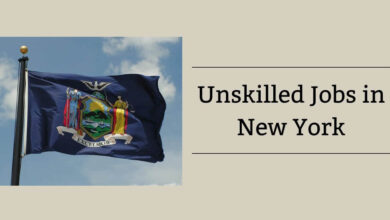Unskilled Jobs in Austria with Visa Sponsorship 2026

Unskilled jobs in Austria offer a salary of 1660 to 1800 EUR per month with opportunities to gain hands-on experience in a thriving European economy. These positions are mostly physical roles in sectors like construction, hospitality, retail, and agriculture, giving individuals a chance to enter the workforce even without specialized qualifications.
Whether you’re looking for stability, the excitement of learning on the job, or simply a stepping stone toward a brighter future, Austria welcomes you with open arms.
Details:
- Job Country: Austria
- Visa type: Job Seeker Visa
- Who can apply? Anyone
- Job offer required: no
Introduction:
Numerous occupations do not require specialized education or training. Hands-on labor or tasks that can be acquired through practical experience are frequently required in these positions, which pander to individuals with limited credentials.
Examples Of Unskilled Jobs:
- Agricultural Laborers
- Construction Workers
- Housekeepers and cleaners
- Retail Assistants
- Warehouse Staff
Visa Sponsorship Advantage:
Importance Of Visa Sponsorship
Sponsorship is an essential element of the employment procedure for foreign nationals in Austria. It allows them to legally reside and work in the country, even in positions that may not require extensive training.
Types Of Visa Sponsorship
- Red-White-Red Card: Skilled Worker
- Red-White-Red Card: Very Highly Qualified Worker
- Rot-Weiß-Rot-Karte Plus: EU Blue Card Holders
- Seasonal Worker Visa
Check Also: Unskilled Jobs in Malta
Which Other European Countries Offer Job Seeker Visa?
Austria is a nation-state in Europe. Apart from Austria, the following European nations issue work-seeker visas:
- Portugal Job Seeker Visa
- Germany Job Seeker Visa
- Sweden Job Seeker Visa
Who Can Apply?
Job Seeker Visa eligibility is not universal.
- Registration is restricted to individuals who are not European.
- EU citizens are not required to obtain a work visa in Austria.
Eligibility:
Candidates for the job applicant visa must achieve a minimum of 70 points out of a possible 100 points following the points criterion system. The following criteria must be satisfied by eligible candidates:
- Graduate as opposed to graduation
- Capabilities and Qualifications
- Required credentials and expertise include those in the fields of mathematics, informatics, natural sciences, or technology.
- Ph.D. or postdoctoral expertise, active in research and innovation
- Praise for Awards
- Experienced working knowledge
- Possibilities in language
- Age of Austrian Studies
Unskilled Jobs In Austria Points Calculator:
For instance, if you possess a specific talent or experience, you will be awarded 40 points. You will receive 20 points for graduating and an additional 20 points for being under the age of 35.
The Points Calculator Table is given below.
| Eligibility criteria for very highly qualified persons | Points |
| Special Qualifications and Skills | Maximum allowable points: 40 |
| Graduation from an institution of higher education; the minimum duration of the program: four years | 20 |
| in the subjects of mathematics, informatics, and natural sciences or technology (MINT subjects) | 30 |
| Post-doctoral qualification (habilitation) or PhD | 40 |
| Gross salary of the previous year earned in a senior management position with a company listed on the stock exchange or a company for which the Austrian foreign trade office in charge issued a positive report about its activities or business segment: €50,000 to 60,000; €60,000 to 70,000; more than €70,000 | 202530 |
| Research and innovation activities (patent applications, publications) | 20 |
| Awards (recognized prizes) | 20 |
| Work experience (adequately reflecting the applicant’s qualifications or senior management position) | Maximum allowable points: 20 |
| Work experience (per year) Six months of work experience in Austria | 210 |
| Language skills | Maximum allowable points: 10 |
| German or English language skills for the elementary use of the language on a basic level (A1 level) | 5 |
| German or English language skills for the intensified elementary use of the language (A2 level) | 10 |
| French language skills for the independent use of the language (B1 level) | 5 |
| Spanish language skills for the independent use of the language (B1 level) | 5 |
| Bosnian, Croatian, or Serbian language skills for the independent use of the language (B1 level) | 5 |
| Age | Maximum allowable points: 20 |
| Up to 35 years of age, 40 years of age, and 45 years of age | 201510 |
| Studies in Austria | Maximum allowable points: 10 |
| The second part of the diploma program (Diplomstudium) or half of the required total ECTS points | 5 |
| Completed diploma program (Diplomstudium) or bachelor’s and master’s degree program | 10 |
| Sum total of maximum allowable points: | 100 |
| Required minimum: | 70 |
Visa Validity:
The Jobseeker Visa, which is valid for six months, allows the holder to legally remain in Austria and pursue employment.
Benefits:
- Employment Opportunities: Unskilled labor positions afford individuals the chance to acquire practical experience and enter the workforce, even if they lack specialized knowledge or advanced education.
- Stability: Numerous menial occupations in Austria are located in construction, hospitality, retail, and agriculture, all of which experience consistent demand. This can provide employees with job security and stability.
- Competitive Wages: In comparison to other nations, Austria’s minimum wages are comparatively high, enabling unskilled laborers to attain a respectable standard of living. In addition, numerous employment opportunities provide perks, including paid time off, medical leave, and pension contributions.
- Advancement Opportunities: Although menial labor may commence with entry-level positions, organizations frequently provide avenues for career progression. Devoted and hardworking personnel may be eligible for advancement to higher-paying positions or participation in skill-building training programs.
- Opportunities for Advancement: Social Benefits Austrian employees are eligible for retirement pensions, health insurance, and unemployment benefits, among others. In times of need, these benefits serve as a safety net for employees and their families.
- Work-Life Balance: Work-life balance is a primary concern in Austrian labor legislation, which encompasses provisions about rest periods, paid holidays, and maximum working hours. This guarantees that even unskilled laborers can allocate time for leisure and familial engagements.
- Access to Education and Training: Opportunities for workers to acquire new skills and credentials abound within Austria’s robust vocational education and training system. Numerous employers provide students with on-the-job training and assistance with continuing their education.
- Assistance for Integration: Austria has established initiatives and programs to facilitate the labor force integration of immigrants and refugees. Employment assistance services, language courses, and job training programs are all included.
Job Seeker Visa Is Not A Work Permit:
It is important to note that a job seeker visa does not qualify as a work permit. It merely facilitates the process of conducting job searches. Upon obtaining an employment offer, an application for a work permit may be submitted.
Processing Time:
- 3 to 5 months may be required to process your visa application.
Visa Cost:
- Jobseeker Visa: € 150
- Red-White-Red Card (This is a work permit):
- Application: € 120
- Granting: € 20
- Costs of personalization (fingerprints, scan of photography, and signature): € 20
Documents Need:
The following documents are required with your application for a job seeker visa:
- A passport is an example of a valid travel document.
- A photograph (45x35mm) that is not older than six months
- Evidence of the existence of locally customary lodging, including lease contracts, preliminary tenancy agreements, or ownership claims.
- Health insurance documentation
How To Apply For Unskilled Jobs in Austria with Visa Sponsorship?
Location to Apply: The Austria Job Seeker Visa (Category D Visa) must be applied for at the Austrian consulate or embassy in your country of origin.
The “Representative” Authority for Austria in your native country that is responsible for receiving your application can be identified by selecting your country from this link.
What Happened After You Received Employment?
Individuals who are in Austria on a Job Seeker Visa and subsequently receive a job offer are eligible to apply for the Red-White-Red Card permit. Please refer to the Austria Job Seeker Visa’s official website and source for additional information.
Conclusion:
Austria’s unskilled job market offers stable employment with salaries of 1660 to 1800 EUR per month and opportunities to gain practical experience. The Job Seeker Visa allows non-EU nationals to legally explore work options while benefiting from social security, training, and career growth. With consistent demand across sectors and strong work-life balance, Austria provides a welcoming environment for newcomers seeking both opportunity and stability.
Frequently Asked Questions:
-
What is the wage for unskilled workers in Austria?
Low-skilled wages in Austria decreased from 1780 EUR/month in 2017 to 1660 EUR/month in 2018. Skilled wages in Austria averaged 1750.00 EUR/Month from 2015 until 2018, reaching an all-time high of 1800.00 EUR/Month in 2016 and a record low of 1660.00 EUR/Month in 2018.
-
Can I easily find a job in Austria?
Job search in Austria. Austria’s unemployment rate is one of the lowest in the European Union. Nevertheless, due to the country’s flourishing economy, the number of vacant positions is continually increasing. The chances of quickly finding a good job in Austria are very high.
-
Who is eligible to work in Austria?
To work in Austria as a non-EU/EEA/Switzerland citizen, you need to obtain an Austrian work visa and work permit. You have two options: either secure a job abroad and have your employer apply for your work visa, or apply for an Austrian job seeker visa and seek employment upon arrival.




